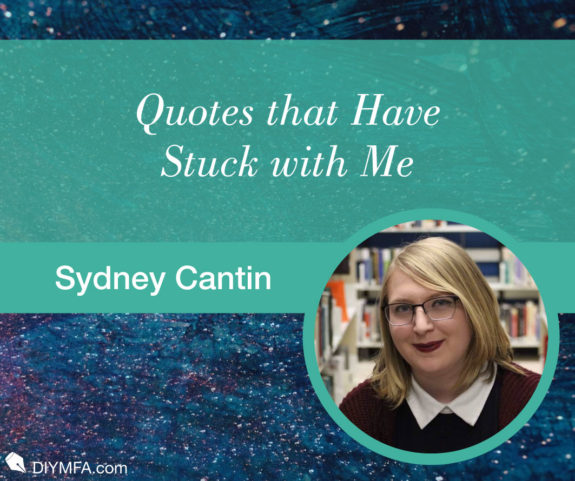Lately I have been thinking about the quotes that have lingered in my mind long after I close their respective books, plays, or poems. Every time I read something new or reread an old favorite there is always new insight to be gained or words to reflect on.
With that in mind I decided to create a list of quotes that have stuck with me for one reason or another. Some are thought-provoking and deep, while others are nostalgic.
Here are ten quotes that have stuck with me:
This above all: To thine own self be true.
William Shakespeare, Hamlet
If I had to pick a favorite quote, I think that this would have to be it.
Hamlet has always been one of my favorite Shakespearean plays, and Polonius’s advice to his son Laertes has always stuck out to me. His words of being true to yourself and honest with others is something that I reflect on frequently.
I have always been obsessed with Shakespeare’s plays and sonnets and frequently revisit his works. Each time I reread through Hamlet a different line catches my attention, but more often than not I find myself thinking about this one. It serves as a nice reminder to be true to who you are no matter what.
What, you egg.
William Shakespeare, Macbeth
Shakespeare is known for his out there insults and snappy comebacks. This is one of his more absurd insults as it comes from one of the murderers right before MacDuff’s family is slain.
This quote is memorable for me because of the memories associated with high school theater. During rehearsals and warm-ups, many of us among the cast would joke about this line in particular well after the final curtain had closed.
That night the soup tasted of corpses.
Elie Weisel, Night
I was a sophmore in high school when I first read Night during our unit on the Holocaust. While it is only 114 pages long, I consider it to be one of the most powerful and eye opening books that I have read.
In this memoir, Weisel documents the unspeakable horrors that he survived in Auschwitz and Buchenwald. This quote comes shortly after Weisel witnesses the execution of a young boy. This line was burned into my memory and has haunted me long after I closed the book.
In class we discussed how this line was about the overwhelming death that surrounded Wiesel. Earlier in the same chapter, he discusses how good the soup tastes because he was so starved, but after the execution that he witnesses the soup is a reminder of the constant trauma and death he is enduring.
They say he gave them but two words. “More weight,” he says. And died.
Arthur Miller, The Crucible
Arthur Miller’s play The Crucible has long since captured my imagination, and I was familiar with Giles Corey’s alleged last words well before I had actually read the book in high school.
At times, I feel that it’s hard to remember that the characters depicted in The Crucible were once real living and breathing people. They were unfairly persecuted and ultimately executed during the Salem Witch Trials.
A few months back, I had the opportunity to spend several days in Salem and really familiarize myself with the history of the witch trials and those that were executed. I was able to stand in the parking lot where Giles Corey was once pressed to death, and the normalcy of this everyday setting and knowing what occurred there during 1692 made the whole experience almost surreal.
Local historians argue that his last words might have instead been to curse the town, or at least that’s what they’ll tell you during ghost tours.
Most people don’t believe something can happen until it already has. That’s not stupidity or weakness, that’s just human nature
Max Brooks, World War Z: An Oral History Of The Zombie War
I first became aware of Max Brooks’s novel World War Z during a class that I was sitting in on in college, but I really did not dive that deep into reading it until about a year into the pandemic. It is written as though it is a compilation of interviews of survivors of a zombie apocalypse. When the book first released in 2006 who would have believed that we would live through a pandemic?
When I first skimmed through passages during the fall of 2019, I would have never believed that Americans would react to a pandemic in such a similar fashion as how certain characters reacted to the zombie outbreak Brooks depicts.
Through the interviews characters discuss the indifference that certain celebrities felt: feeling that their fame and wealth would save them, politicians that blamed the other side and tried turning the zombie out into a political issue, and, of course, characters that actively denied the zombie outbreak as it was happening.
So many of the “interviews” contained in the book almost intensified the horror when reading through it with a post-Covid lens.
But we loved with a love that was more than love.
Edgar Allan Poe, “Annabel Lee”
Like with Shakespeare, it was hard for me to narrow this list down to only one quote from Edgar Allan Poe. Ultimately, I selected this lovely quote from his last completed poem, “Annabel Lee.”
This quote has stuck with me because it highlights the softer, more tender side of Poe. While the poem is melancholic as it focuses on the themes of loss and love. It highlights his gentler side rather than showcase his horror prowess.
I’ll give this letter to a worm. I hope he finds you.
Sarah Ruhl, Eurydice
In all of the ways that Orpheus ends his letters to his dearly departed Eurydice, this has always been my favorite. Eurydice reimagines the Greek myth of Orpheus trying to rescue his deceased wife from the underworld.
The play focuses more so on her time spent in the underworld and the love that she and her father have for one another. Within this play there are short heartfelt scenes of Orpheus desperately trying to reach her through letters driven by his love and grief to find her.
A book is a loaded gun in the house next door. Burn it. Take the shot from the weapon. Breach man’s mind. Who knows what might be the target of the well-read man?
Ray Bradbury, Fahrenheit 451
Each time there is discussion of books being banned or an uproar of book bannings in schools, I think back to Farenheit 451 and the discussions against book bannings that Bradbury leads in this book.
In the world that Bradbury creates, all books have been banned and are burned on sight. This particular quote comes from Captain Beatty as he explains to Montag why the firemen burn books. This is from the first third of the book where Montag starts to question the world around him while stealthily trying to read books as he gains their forbidden knowledge.
Whenever there is a call to ban a book I reflect and think back to this book, which ironically has experienced calls to ban it as well. When people seek to ban a book, I urge them instead to read it and reflect on the content or knowledge held inside.
Why is it being banned? What ideas or thoughts does it challenge? Who benefits from it being banned?
He told me to look at my hand for a part of it came from a star that exploded too long ago to imagine.
Paul Zindel, The Effect of Gamma Rays on Man in the Moon Marigolds
From the very beginning of The Effect of Gamma Rays on Man in the Moon Marigolds, Paul Zindel establishes Tillie’s thoughtfulness and curiosity. The beauty of her opening words discuss the interconnectedness of the world.
When I first heard a friend perform this monologue, the opening line captured my attention and directed me to this play that features a young girl turning to science as an escape from the abuse she endures at home. Zindel’s play focuses on her resilience when faced with trauma and it is both beautiful and heartbreaking at the same time.
My name is Junie B. Jones. The B Stands for Beatrice. Except I don’t like Beatrice. I just like B and that’s all.
Barbara Park, Junie B Jones series
This quote is memorable not only through its repetition throughout Park’s series, but for childhood nostalgia as well.
I have very vivid memories of reading these books with my mom and with my grandmother. We would sit on my bed or the seat of my bay window and read these books for hours. These beginning chapter books helped foster my love of reading, as I’m sure they did for many others.
I would always get so excited when my mom would start reading the opening line about her name because I knew that we were in for another fun and silly adventure with Junie B.
Now, as a teacher, when I look around and see my students reading Junie B Jones, I smile as I see them enjoying the same books that I did when I was their age.
No matter what I read, I take little pieces of the stories with me. Whether it is new knowledge gained or thought-provoking quotes to reflect on, the stories that we read become a part of us. While compiling this list of quotes I was able to revisit old favorites and reflect more on what it was that I have taken away from them.
Tell us in the comments: What quotes stuck with you?

Sydney Cantin currently resides in Kansas with her husband and their two guinea pigs. Cantin teaches elementary school, but outside of the classroom she enjoys writing short stories and free verse poetry. Recently Cantin celebrated her first poetry publication with her poem “Walks with Grammy” in the limited release of Where The Wind Blows, which was put together by the students of Bethany College’s book publishing course. She hopes to one day publish a book of her own and is actively working towards that goal.







